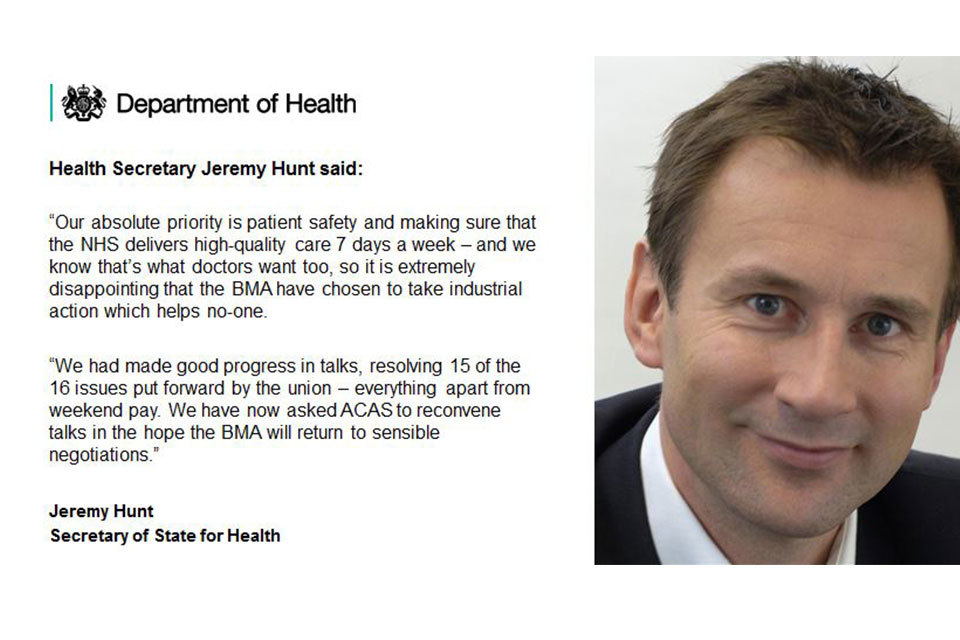Junior doctor contract negotiations
This page will be regularly updated with the latest information on the junior doctor contract negotiations.

NHS ward
Latest updates
Jeremy Hunt has made a statement to Parliament on the proposed industrial action.
The BMA has suspended the strike planned for 12-16 September.
Previous updates
On 31 August the BMA announced further industrial action of a full withdrawal of labour, including emergency cover, for 5 days, between 8am to 5pm from Monday 12 to Friday 16 September, with further dates to be confirmed.
A Department of Health spokesperson said:
As doctors’ representatives, the BMA should be putting patients first not playing politics in a way that will be immensely damaging for vulnerable patients. What’s more, the BMA must be the first union in history to call for strike action against a deal they themselves negotiated and said was a good one.
While there are many pressures on the frontline, funding is at record levels, with the highest number of doctors employed in the history of the NHS. Co-operation not confrontation is the way forward to make sure patients get the best treatment and the NHS is there for people whenever they need it.
On 6 July the Health Secretary outlined the phased introduction of the new junior doctors’ contract from October 2016 in an update to Parliament.
On 5 July the BMA announced that junior doctors and medical students in England had voted to reject the new contract 58% to 42% on a 68% turnout.
Jeremy Hunt said:
It is extrememly disappointing that junior doctors have voted against this contract, which was agreed with and endorsed by the leader of the BMA Junior Doctors’ Committee and supported by senior NHS leaders.
The BMA’s figures show that only 40% of those eligible actually voted against this contract, and a third of BMA members didn’t vote at all. We will now consider the outcome.
On 27 May, NHS Employers published the terms and conditions of the contract agreement, as reached by the government, NHS Employers and the BMA. This has been agreed by the government, NHS Employers and the BMA, subject to securing the support of BMA junior doctor members in a referendum.
The Department of Health have also published an equalities statement, which considers the new proposals and their impact on junior doctors.
On 18 May, ACAS issued a statement setting out the terms of an agreement presented to the government and NHS Employers, and to the BMA. This has now been agreed by all parties as resolving the current dispute, subject to securing the support of BMA junior doctor members in a referendum.
Jeremy Hunt wrote to Professor Dame Sue Bailey, Chair of the Academy of Royal Colleges on 5 May 2016 in response to the Academy’s call for a pause in the introduction of the new contract. He agreed to pause for 5 days from Monday 9 May should the Junior Doctors Committee agree to return to talks.
On 25 April, Jeremy Hunt gave a statement to Parliament on NHS 7 day services and the impact of industrial action by junior doctors. He also wrote a second letter to Mark Porter and reiterated that his offer to meet to find a way forward was still open.
On 24 April, Jeremy Hunt wrote to Mark Porter, Chair of the BMA, to invite him to a meeting on Monday 25 April and to appeal to him to avert the strike planned for later that week, when junior doctors will withdraw potentially life-saving care for the first time.
On 19 April the Health Secretary wrote a response to the letter from the BMA’s Chair of Junior Doctors’ Committee, Dr Johann Malawana, about the forthcoming industrial action on 26 and 27 April.
On 31 March, the equality analysis of the new junior doctors’ contract was published. The new terms and conditions were also published by NHS Employers.
On 23 March the BMA announced its intention to escalate industrial action to a full withdrawal of labour, including emergency cover, for 48 hours on 26 to 27 April.
A Department of Health spokesperson said:
This escalation of industrial action by the BMA is both desperate and irresponsible – and will inevitably put patients in harm’s way.
If the BMA had agreed to negotiate on Saturday pay, as they promised to do through ACAS in November, we’d have a negotiated agreement by now – instead, we had no choice but to proceed with proposals recommended and supported by NHS leaders.
On 8 March the Government Legal Department set out the Health Secretary’s response to the proposed claim for judicial review by the BMA regarding the introduction of the new contract.
Dr Mike Durkin, NHS National Director for Patient Safety, wrote an open letter to junior doctors on 4 March in which he described the contract changes as ‘good for doctors and patients’.
On 23 February the BMA announced 3 further dates of industrial action in March and April.
More information about the new contract is on the NHS Employers website.
The Health Secretary gave a statement to Parliament on the introduction of the new junior doctors’ contract on 11 February.
An independent review into junior doctors’ experience of their training and support while working for the NHS and looking at the long-standing issue of low morale was also announced.
On 10 February Sir David Dalton wrote to Jeremy Hunt to update him on the negotiations and to advise that government should do whatever it deems necessary to end uncertainty for the NHS.
On 3 February Sir David Dalton wrote to all doctors in training, updating on the progress with negotiations with the BMA Junior Doctors Committee.
Sir David Dalton wrote to the Secretary of State on 1 February setting out where the talks had got to by 29 January when they adjourned.
On 1 February the BMA announced its intention to strike on 10 February as planned but modified the level of service it asked junior doctors to withdraw. Rather than an all out strike, emergency services were still provided and the strike lasted for 24 hours from 8am.
Jeremy Hunt wrote to the Chair of the BMA Council, Mark Porter, in response to the latest decision to strike.
The BMA announced its intention to suspend the previously announced 48-hour strike as talks continue.
A DH spokesperson said:
The strike that took place last week was unnecessary while talks are ongoing, so it’s extremely welcome news that the BMA has suspended next week’s action, though as it stands emergency care will still be withdrawn in February. In the end, the government and junior doctors want to do the same thing by improving patient care at weekends – and we look forward to further constructive discussions.
ACAS, the conciliation service, announced that all parties had agreed to recommence talks on Thursday 14 January to try and reach a negotiated settlement.
NHS England has published a statement on the action taken on 12 January.
Sir David Dalton, Chief Executive of Salford Royal NHS Foundation Trust has been appointed by the Health Secretary to lead negotiations on behalf of government and the NHS in new talks with the BMA.
Letter to all junior doctors
On 7 January, 3 senior NHS leaders wrote to every junior doctor at the request of Sir David Dalton regarding the proposed new contract for junior doctors. This included key areas such as pay and safety and non-contractual matters around training, to ensure every junior doctor was in full possession of as much relevant information as possible in advance of industrial action.
Read summaries of the detail on safety, training and pay taken from the full letter.
The conciliation service, ACAS, facilitated talks on Friday 8 January in which it was agreed that talks would continue in the week beginning 11 January.
Announcement of strike action
Following weeks of talks, NHS Employers’ Chief Executive Danny Mortimer wrote to Jeremy Hunt on 4 January 2016 outlining the position the contract negotiations had reached as the BMA announced its intention to take industrial action.
In response to the BMA’s announcement the Health Secretary wrote to Chair of the BMA Mark Porter expressing his disappointment at the decision.

Jeremy Hunt quote about strike
Background
The government wants to modernise the junior doctor contract to make it fairer for doctors and safer for patients.
In 2012 the British Medical Association and NHS Employers began discussions on the new contract. The negotiations broke down in October 2014. An independent review body, the Doctors’ and Dentists’ Review Body (DDRB), was invited to review the contract and to make recommendations, which were published in July 2015. The BMA declined to re-enter negotiations at that point.
Watch a video of the Secretary of State’s reaction to the BMA’s previous call for strike action
The Secretary of State’s reaction to news that the BMA had called for strike action
The new contract offer, which takes account of the DDRB recommendations, was published in November 2015 by NHS Employers.
NHS Employers is the organisation that represents NHS workforce employers and has published full details of the contract offer and resources for junior doctors
The Health Secretary made a written statement to Parliament on 4 November on the proposed contract and invited the BMA to return to the negotiations without preconditions.
The Secretary of State gave a speech to Parliament on 30 November 2015, outlining that agreement had been reached to continue negotiations and avert the previously planned strike action.
ACAS published a memorandum of understanding which set out the terms under which the negotiations would proceed.
Updates to this page
-
Added link to Jeremy Hunt's statement to Parliament.
-
BMA suspends industrial action planned for 12-16 September 2016.
-
Added information about the 5-day strike from 12-16 September.
-
Statement by Jeremy Hunt added.
-
Links to terms and conditions of the contract and the equalities statement added.
-
Link to ACAS statement added.
-
Added the letter from Jeremy Hunt to Professor Dame Sue Bailey on 5 May.
-
Added a link to a second letter to Mark Porter
-
Added link to Jeremy Hunt's statement to Parliament.
-
Added latest letter from Jeremy Hunt to Mark Porter
-
Added a link to NHS Strike - where patients and the public can get advice and information regarding the strike on 26 and 27 April.
-
Added link to the letter from Jeremy Hunt to Dr Johann Malawana - Chair of Junior Doctors' Committee at the BMA.
-
Added information about the 2-day strike on 6-8 April.
-
Links to equality analysis and terms and conditions added.
-
Added information about the BMA decision to withdraw all labour on 26 and 27 April.
-
Added link to letter setting out Health Secretary’s response to the BMA's proposed claim for judicial review.
-
Added the open letter from Dr Mike Durkin, NHS National Director for Patient Safety
-
Statement on industrial action added.
-
Added information about the independent review led by Professor Dame Sue Bailey
-
Added Jeremy Hunt's oral statement to Parliament on the introduction of the new junior contract
-
Added latest letter from Sir David Dalton to Jeremy Hunt following the strike on 10 February.
-
Added NHS England advice to patients ahead of the strike on 10 February
-
Added link to David Dalton letter to all doctors in training.
-
Added Jeremy Hunt's letter to Mark Porter on 1 February 2016
-
Added link to David Dalton letter to Jeremy Hunt on 1 February 2016
-
Added latest statement from ACAS on the progress of the talks
-
BMA agrees to suspend 48 hour action planned for next week.
-
Added information about new ACAS talks
-
Updated to include NHS England's latest statement
-
Added links to information on NHS Choices with advice on today's industrial action
-
Added summary information from the letter to all junior doctors on safety, training and pay
-
First published.